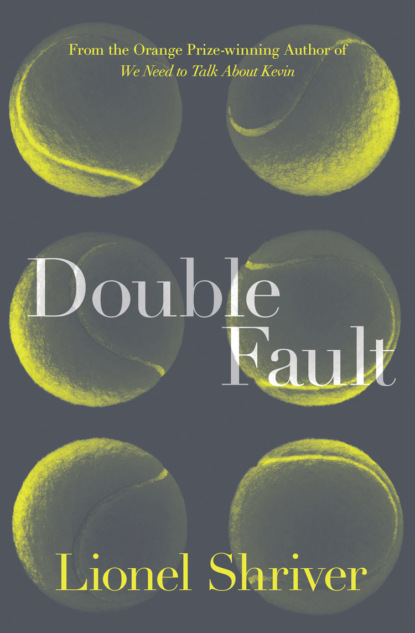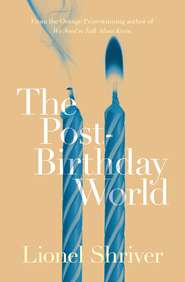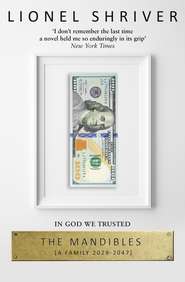По всем вопросам обращайтесь на: info@litportal.ru
(©) 2003-2024.
✖
Double Fault
Автор
Год написания книги
2019
Настройки чтения
Размер шрифта
Высота строк
Поля
And Willy had never been more coldly conniving. Her sidespins were given a happy assist when they landed on berries. She’d sweep her racket back as if for a doozy and at the very last second bring it to a shrieking halt; dink, the ball would cough over the tape and wheeze to Eric’s feet. Finally, when he’d been lulled into anticipating only junk, she’d let tear, jangling the ball into the fence. Composed and serenely mechanical, Willy dispatched the first set 6–2.
Receiving in the second at 5–1, Willy reflected that she’d aimed only to enrage him, to teach Eric that he could be fervid once he got out of bed. Yet her methods had begun to backfire. The score was sweet enough; she needed only to break him this game, or hold the next. But instead of at last revealing his wit’s end—by kicking another of her winning balls at the net, or at least shooting her a glare—Eric had started to laugh.
His serve went wiggly and folded into her service court, as if itself doubled over in hysterics. She flattened it. He didn’t even attempt to retrieve, and wiped away a tear. Willy narrowed her eyes to make them all the more steely, and disciplined her mouth to a bar. Meanwhile he had started to hoot, losing his balance and gasping for breath. At love–40, match point, he shoveled a fat, juicy floater to her midcourt. She squashed it. Barely able to get the words out through his guffaws, he said something.
The match over, it was now permissible to speak. “What was that?” asked Willy courteously.
This time he shouted unmistakably, “Marry me!”
Willy cartwheeled her racket fifteen feet in the air, and caught it neatly by the grip. Oberdorf had finally displayed a little passion on the tennis court.
chapter 5 (#ulink_c23bc8a8-b4a9-5970-b6cd-e1fcdf934dc6)
If twenty-three was young to marry for 1992, Willy did not situate herself in modern history any more than she regarded herself as American. She owed allegiance to the tennis court, whose lines described a separate country, and to whose rigid and peculiar laws she adhered with the fervor of patriotism. Likewise Willy conceived of her lifespan in terms of the eighteenth century. As a tennis player, she would at best survive to forty; twenty-three was middle-aged.
That the institution of marriage had been thoroughly discredited by the time Willy was born didn’t delay her acceptance of Eric’s proposal by ten seconds. Granted, her own parents set a poor example; Willy envied neither her glumly patriarchal father nor his cheerfully submissive sidekick. But she might have envied her parents at their first meeting, in 1961: when her mother, Colleen, was a flighty modern dance student, leaping through recitals to the beat of bongos inside a helix of scarves, and her father, Charles, was an undiscouraged beatnik scribbler, whose pockets bulged from squiggled napkins and leaky ballpoint pens. Willy clung to the notion that nothing about marriage itself condemned her mother to dismiss an ambition to dance as vain folly, nor her father to turn on his own credulous literary aspirations with such a snarl. And surely had she wed in this more liberal era, the acquiescent Colleen might have told Charles to get a grip and stop moaning and sometimes gone her own way. Despite overwhelming evidence that both true love and domestic balance of power were myths, Willy still believed in the possibility of an ardent, lasting union between equals, much as many religious skeptics still kept faith in an afterlife because the alternative was too unbearable.
So all through a militantly independent young adulthood Willy had been waiting. At last along came Eric Oberdorf, who radiated the same clear-eyed courage that shone from pictures of her father in the early sixties—before Charles joined the opposition in celebrating his own defeat. Willy had inherited her mother’s grace, and given it structure and purpose. Together she and Eric could rewrite history, which may have been what children were for.
As for Eric, Willy’s primary concern was that he might regard marriage, like his so far useless degree in mathematics, as an end in itself. Eric had a modular mind. He might not conceive of pro tennis as death row, but he thought of his life in blocks, and therefore as a series of little deaths. But Willy knew enough about the altar to be sure that marriage demarcated not only the successful completion of a project, but the beginning of another, far more demanding endeavor.
“Daddy, it’s Willy.”
“Hola!”
Willy let the receiver list. Her father had never forgiven her for majoring in Spanish. “You’re going to interpret for the UN?” he’d inquired dryly when informed of her decision. “No, I’ll sell veggie burritos in Flushing Meadow,” she’d snipped back. “Which by the time I finish this BA is the closest I’m going to get to the U.S. Open.” Her father held nothing more against Spanish people than against anyone—meaning he held a great deal against them, indeed. But he knew that she’d chosen an easy major to have maximum free time for the tennis team.
“Qué tal?” asked Willy.
“Nothing ever changes here, Willow, you know that.”
“You could always get old and die,” she recommended. “At least that would get it over with.”
“It’s important to keep something to look forward to.”
“Listen, I have someone I want you to meet.”
“Another brain surgeon?”
“Yes, he’s a tennis player, Daddy,” she said impatiently. “But with a degree from Princeton.”
“A tennis player with a degree!” he exclaimed. “You told me that was impossible.”
Willy almost hung up. If she could barely make it through this phone call, how was she going to survive the whole evening she proposed? “How about Friday night? We’ll take the seven-twenty from Port Authority.”
“I’m sure I can squeeze you and your young man into my busy social calendar.”
“Listen, Daddy,” she added effortfully. “I really like this guy. Could you … be friendly?”
“Willow, I’m always—”
“I mean, don’t be quite such a gloomy Gus? Like, don’t rain on any parades for one night.”
“Gloomy! After an electrifying week of teaching budding car mechanics commonly confused words, I’m sure to be happy as a clam.”
“Oh, never mind,” said Willy, and hung up with a sigh.
“When you first talked about your father, I thought he was some working-class stiff,” Eric swung the Chateauneuf du Pape in its plastic bag, “not an English professor.”
“I’m sorry if I seem dismissive of his job,” Willy mumbled. “But that’s the product of careful coaching.”
They were standing in line at Gate 413. Willy was relieved that the bus was late. Her stomach knotting, she now wished they’d brought two bottles of wine.
“When I was a kid my father sensed I admired him,” Willy went on, “since any little girl would. I must have been—oh, eleven, alone with my father in the car. He explained that most of his classes could barely read, so if teachers were judged by the quality of their students my father was, I quote, ‘the bottom of the barrel.’ He announced that with a weird, vicious pleasure.”
“What’s his problem?” asked Eric as the line began to move. “Bloomfield College isn’t a great school, but it’s not disgraceful.”
“To Chuck Novinsky it is. I didn’t understand until I was fifteen. Nobody had told me. I was pottering in the attic when I found a box of duplicate hardbacks. Unappealing cover—plain; I think it was cheap. In the Beginning Was the Word, by Charles Novinsky.”
Eric chuckled. “A little inflated, if you don’t mind my saying so. What was it, criticism?”
Willy glanced at her fiancé in the light streaming through the door of Gate 413. A fresh feeling came off of him that had nothing to do with having ironed his shirt for the occasion. His mental basement wasn’t knee-deep in naysaying bilge; the storage in his parents’ ritzy East Side apartment wouldn’t breathe musty disillusionment.
“A novel,” she said sorrowfully, climbing into the bus and snuggling by a window. “Begpool Press, 1962—never heard of them.”
“Did you read it?”
“I had a feeling that I shouldn’t mention the books to my father. So I sneaked up to the attic with a flashlight.”
“Was it any good?”
“I don’t know,” she puzzled.
Had her father’s book been any good? Naturally the novel had commented on the nature of literature, and there wasn’t a soul who wanted to read about that; likewise it celebrated the power of language, a power he now derided. The plot was playful, about a novelist whose every printed word came to life. (She loved it when a mixed metaphor gave rise to a grotesque behemoth slouching toward the narrator’s house until he frantically rewrote it.) But the prose clanked with thesaurus plunder, a whole paragraph conceived to accommodate stereotropism. Still, the slim volume seemed an eager, trusting effort and couldn’t have deserved the scathing reviews shoved down the side of the box.
“The reviews were hideous.” Willy shuddered. “All in local papers, fly-by-night magazines. Probably by young journalists trying to make a name for themselves, and so acrobatically snide. One reviewer called In the Beginning Was the Word so awful that it was ‘a bit of a giggle.’”
Newly curious, Willy had located a second box, where four different rubber-banded typescripts were crammed into waterlogged cardboard, their pages folded and specked with roach eggs. She’d been reluctant to paw those reams, once treasure, now trash—thousands of offbeat adjectives mined from Roget’s, only to slump in this carton and rustle with insects. She’d scanned only the most recent manuscript, on top, heart-breakingly protected with “Copyright(c) 1967 by Charles Novinsky” on the title page.
The End of the Story had been more of a slog. The prose was dry and spare, recalling the cutting, droll sarcasm of the father she knew. The satire described a mythical population grown so vicarious that content was extinct. An automated world whose only work was entertainment divided between the watcher and the watched. Consequently, all art was reflexive: films concerned screenwriters, TV programs followed the “real lives” of sitcom actresses, and novels, the author noted with special disgust, exclusively detailed the puerile pencil-sharpening of literary hacks. The manuscript had left off on page 166 in the middle of a sentence. Little wonder; with its theme that storytelling was dead, the narrative dripped with such self-loathing that to finish such a book would be antithetical.
“That last manuscript was depressing,” said Willy. “He’d even worked the phrase ‘a bit of a giggle’ into the text. He was smarting. I’m not sure he’s smarting anymore, which is probably what’s wrong with him.”
“You think all those failed novels explain why he’s discouraged you from playing tennis?”
“I wouldn’t be that simplistic. I’d give my parents some credit for genuinely wanting to protect me. Original sin in my family is getting your hopes up.”
“Honey?” They’d been sitting on Willy’s bed; her mother had patted her hand. Willy was seventeen, and still feuding with her father over college. “Every young person wants to be a celebrated artist, a fashion model, or a big-name sports star. All but a very, very few end up working for IBM, or teaching youngsters who themselves want to be famous that they still have to learn to spell, like your father. And there’s nothing wrong with having an ordinary life. We’d just like you to be prepared. If you set your heart on being Chris Everest—”











